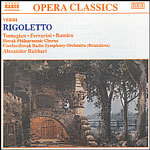
Rigoletto (Complete opera)
 $28.00
Out of Stock
$28.00
Out of Stock6+ weeks add to cart
VERDI
Rigoletto (Complete opera)
Jozef Abel (tenor) Alida Ferrarini (soprano) Alzbeta Michalkova (contralto) / Slovak Philharmonic Chorus / Slovak Radio Symphony Orchestra / Rahbari
[ Naxos Opera Classics / CD ]
Release Date: Monday 8 March 2004
This item is currently out of stock. It may take 6 or more weeks to obtain from when you place your order as this is a specialist product.
"Eduard Turmagian gives...a lucidly thought-through performance, dramatically sensitive...This recording of Rigoletto is astonishing value"
- Gramophone
"Eduard Turmagian gives a powerful, fully-rounded portrayal of the tormented jester... he gets fully inside the jester's skin, inspiring both laughter and pity, and drawing the character in burnished and vibrant tones.... [Ramiro] pleasantly full-bodied lyric tenor, a good technique a sense of style and some imagination..[Ferrarini] a coloratura soprano of notable accomplishment... a first rate bargain and well worth adding to anyone's collection"
- Classics
Giuseppe Verdi's career spans three quarters of the nineteenth century. He was born in 1813 at Roncole, near Busseto, the son of a tavern-keeper, and distinguished himself locally in music. The encouragement and patronage of his future father-in-law, Antonio Barezzi, a merchant in Busseto, allowed him further study in Milan, before returning to Busseto as maestro di musica. His first venture into opera, a reasonably successful one, was in 1839 with Oberto. This was followed, however, by the failure of Un giorno di regno, written at a period when the composer suffered the death of his wife and two children. His early reputation was established by the opera Nabucco, staged at La Scala in Milan in 1842.
Verdi's subsequent career in Italy was to bring him unrivalled fame, augmented by his reputation as a patriot and fervent supporter of Italian national unity. His name itself was treated as an acronym for the proposed monarch of a united Italy, Vittorio Emanuele Re d'ltalia, and much of his work in the period of unification was susceptible to patriotic interpretation. His long association with the singer Giuseppina Strepponi led to their marriage in 1859, the year of II ballo in maschera. He completed his last opera, Falstall, in 1893, four years before her death, but felt himself unequal to further Shakespearian operas that were then proposed. He died while staying in Milan, early in 1901, his death the subject of national mourning throughout Italy.
The opera Rigoletto was first staged at La Fenice in Venice on 11th March, 1851. A year earlier Verdi had expressed his delight with Victor Hugo's play Le roi s'amuse, finding in Triboulet, the central character, a creation worthy of Shakespeare. He urged his librettist Francesco Maria Piave, poet and stage manager of La Fenice, to secure the approval of the censors as soon as possible. Piave did as Verdi suggested, but whatever verbal approval he had from the censors was denied when it came to the point. The operatic version of Le roi s'amuse, under the title La maledizione (The Curse), was stigmatized as immoral and obscene. The obscenity lay chiefly in the fact that the plot deals with the unscrupulous activities of a profligate king.
Piave's first suggested changes did not please Verdi. The King, Francis I, was to be a mere nobleman, the Duke of Ventignano, and there was to be no plot to kill him, while the murdered Gilda's body was not to be concealed in a sack: Triboletto, the original of Rigoletto, the court jester, was not to be an ugly hunchback. Negotiation with the censors followed, and something of Victor Hugo was restored. The villain was to be Vincenzo Gonzaga, Duke of Mantua, referred to only as the Duke of Mantua, the deformity of the jester was permitted and there was no longer any objection to the sack. Censorship had caused delay and frustration, but by the end of December 1850 the matter was near enough to a settlement to allow Verdi to proceed with the composition in time for the carnival season.
Verdi had not only been angered by the censors and consequently impatient with Piave. He had also had serious reservations about the proposed prima donna, Signora Sanchioli, known, Verdi suggested, for her Michelangelesque poses. The final cast had Teresa Brambilla as the first Gilda, a 38-year-old singer, one of seven sisters well known on the operatic stage. The French-Italian baritone Felice Varesi, who had created the Verdian role of Macbeth, was the first Rigoletto, and the part of the Duke was taken by the tenor Raffaele Mirati. Varesi's daughter later recalled her father's doubts about the possible reaction of the audience to his appearance as a hunchbacked buffoon and how Verdi pushed him onto the stage at the first performance, causing him to stumble, but at the same time impressing the audience, enraptured by such a dramatically appropriate entrance.


